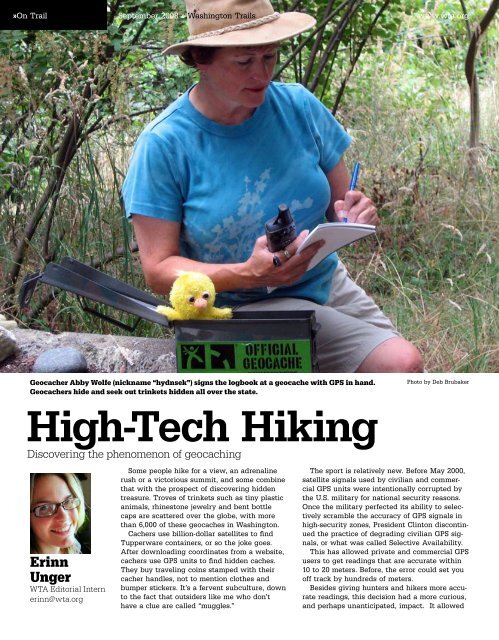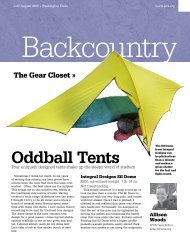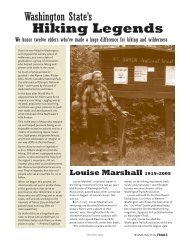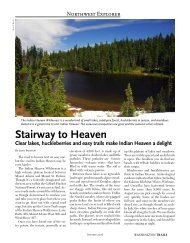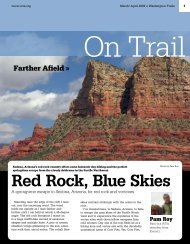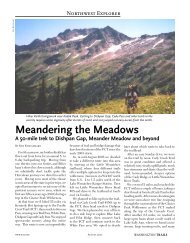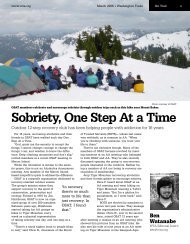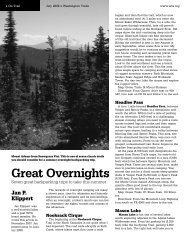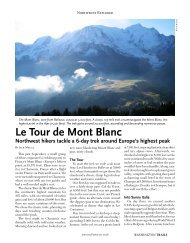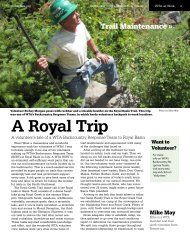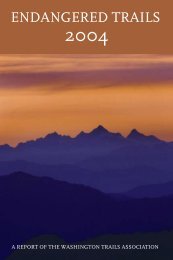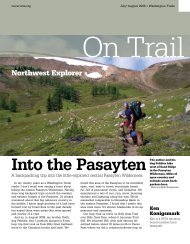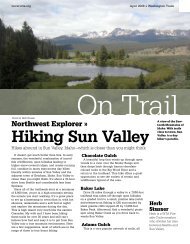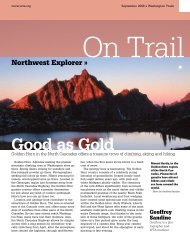High-Tech Hiking - Washington Trails Association
High-Tech Hiking - Washington Trails Association
High-Tech Hiking - Washington Trails Association
You also want an ePaper? Increase the reach of your titles
YUMPU automatically turns print PDFs into web optimized ePapers that Google loves.
» On Trail September 2008 » <strong>Washington</strong> <strong>Trails</strong> www.wta.org<br />
Geocacher Abby Wolfe (nickname “hydnsek”) signs the logbook at a geocache with GPS in hand.<br />
Geocachers hide and seek out trinkets hidden all over the state.<br />
Photo by Deb Brubaker<br />
<strong>High</strong>-<strong>Tech</strong> <strong>Hiking</strong><br />
Discovering the phenomenon of geocaching<br />
Erinn<br />
Unger<br />
WTA Editorial Intern<br />
erinn@wta.org<br />
Some people hike for a view, an adrenaline<br />
rush or a victorious summit, and some combine<br />
that with the prospect of discovering hidden<br />
treasure. Troves of trinkets such as tiny plastic<br />
animals, rhinestone jewelry and bent bottle<br />
caps are scattered over the globe, with more<br />
than 6,000 of these geocaches in <strong>Washington</strong>.<br />
Cachers use billion-dollar satellites to find<br />
Tupperware containers, or so the joke goes.<br />
After downloading coordinates from a website,<br />
cachers use GPS units to find hidden caches.<br />
They buy traveling coins stamped with their<br />
cacher handles, not to mention clothes and<br />
bumper stickers. It’s a fervent subculture, down<br />
to the fact that outsiders like me who don’t<br />
have a clue are called “muggles.”<br />
The sport is relatively new. Before May 2000,<br />
satellite signals used by civilian and commercial<br />
GPS units were intentionally corrupted by<br />
the U.S. military for national security reasons.<br />
Once the military perfected its ability to selectively<br />
scramble the accuracy of GPS signals in<br />
high-security zones, President Clinton discontinued<br />
the practice of degrading civilian GPS signals,<br />
or what was called Selective Availability.<br />
This has allowed private and commercial GPS<br />
users to get readings that are accurate within<br />
10 to 20 meters. Before, the error could set you<br />
off track by hundreds of meters.<br />
Besides giving hunters and hikers more accurate<br />
readings, this decision had a more curious,<br />
and perhaps unanticipated, impact. It allowed
www.wta.org September 2008 » <strong>Washington</strong> <strong>Trails</strong> On Trail «<br />
GPS-toting civilians to search out more than<br />
600,000 plastic containers full of tchotchkes hidden<br />
across every continent—including Antarctica.<br />
Geocaching.com is the primary site for geocachers<br />
to log caches they’ve placed and caches<br />
they’ve found, plus communicate with other<br />
members. The website, and the company that<br />
manages it, called Groundspeak, was started in<br />
2000 in Seattle.<br />
The sport had its origins when, soon after Selective<br />
Availability was turned off, a computer<br />
consultant named Dave Ulmer hid a bucket full<br />
of trinkets, including a can of beans (alas, no<br />
longer allowed by geocaching regulations) in<br />
the wilderness near Portland, Oregon. He gave<br />
out the GPS coordinates on a web forum and<br />
had one rule that has stuck: “Take some stuff,<br />
leave some stuff.”<br />
In recent years, the practice of geocaching<br />
has soared in popularity. There used to be<br />
fewer than 15 caches on Whidbey Island and<br />
now there are at least 60, according to Abby<br />
Wolfe, an experienced geocacher, orienteer and<br />
member of WTA.<br />
Her geocaching name is “hydnsek” (which is<br />
also, I discovered, on her license plate), and she<br />
has found more than 4,000 caches and has hidden<br />
50 since she began geocaching in 2003.<br />
She and I trekked around Cougar Mountain<br />
Regional Wildland Park to find just a small fraction<br />
of those.<br />
While I was on my hands and knees, combing<br />
through duff and feeling blindly behind<br />
stumps, she stood behind me, offering vague<br />
clues. When I finally found one of the caches<br />
and pried it open for inspection, she beamed,<br />
as if I were a child who had brought home an<br />
excellent report card. My prize was a small,<br />
scuffed plastic crab, which I zipped into my<br />
jacket pocket for safekeeping.<br />
Cougar Mountain isn’t the wildest place<br />
to cache, squeezed as it is next to Bellevue,<br />
Newcastle and Issaquah, but it is accessible to<br />
those who may have a difficult time navigating<br />
backcountry trails. There are caches that are<br />
handicapped accessible; others require seekers<br />
to scuba-dive, paddle or even rappel to their locations.<br />
Many are cropping up in the middle of<br />
cities, strapped to parking meters or lampposts.<br />
There are even virtual ones—including one in<br />
Nepal, near Mount Everest—that require cachers<br />
to take photographs or answer questions to<br />
prove they found the correct location.<br />
There is no right or wrong to caching, Wolfe<br />
said, though she prefers caches that require a<br />
hike to get to. Her background is in orienteering,<br />
and she likes getting “dirty and twiggy” in<br />
the woods.<br />
“I’ve been to every county, done tons of backcountry<br />
hiking, summitted Mount St. Helens<br />
and climbed to Camp Muir on Mount Rainier,<br />
and more,” Wolfe wrote in an e-mail. “There<br />
are hikes of the month, annual trips to Mount<br />
Rainier [where she only hikes—geocaching isn’t<br />
allowed there], loads of one-off hiking outings,<br />
plus I do a lot of hiking just on my own, as do<br />
other cachers,” she said.<br />
“While geocaching may have been more<br />
prevalent in the Northwest in its early years, it<br />
is now a worldwide phenomenon,” said Laurie<br />
Freeman, the president of the <strong>Washington</strong> State<br />
Geocaching <strong>Association</strong> “Being an Internetbased<br />
sport, it has spread quickly across most<br />
of the globe.”<br />
“A lot of families got into it, that’s what made<br />
it take off,” Wolfe said. “It would be hard to find<br />
a hiking area that doesn’t have caches these<br />
days.”<br />
Some cachers, Wolfe said, “wax nostalgic”<br />
about the old days when there were fewer<br />
urban caches and when the activity was less<br />
popular.<br />
“Early placers were more hikers, climbers and<br />
outdoor people,” she said.<br />
As with many recreational activities that occur<br />
in what can be delicate habitat, there are<br />
critics and supporters of the practice.<br />
Cachers seek treasure in high places as well as low. Caches can be found at the Red Top<br />
Lookout in the Blewett Pass area, offering views and hidden treasures.<br />
Photo by Abby Wolfe<br />
Where is it<br />
off-limits?<br />
Use common sense.<br />
Don’t lurk around<br />
schools, or possible<br />
terrorist targets<br />
(this includes large<br />
bridges).<br />
Railroad tracks<br />
require a 150-foot<br />
buffer on either<br />
side of the tracks for<br />
safety.<br />
Don’t cache on<br />
private property<br />
(this includes Indian<br />
reservations)<br />
Geocaching is prohibited<br />
in<br />
National Parks,<br />
National Wildlife<br />
Refuges and Forest<br />
Service wilderness<br />
areas in the Cascades<br />
of <strong>Washington</strong>.<br />
Little Spokane River<br />
Natural Area (this<br />
area within Riverside<br />
State Park) is closed<br />
to caches.<br />
For more<br />
info<br />
Check out:<br />
www.geocaching.<br />
com<br />
Get connected<br />
locally with the<br />
<strong>Washington</strong> State<br />
Geocaching<br />
<strong>Association</strong>:<br />
www.geocachingwa.<br />
org
» On Trail September 2008 » <strong>Washington</strong> <strong>Trails</strong> www.wta.org<br />
Sometimes it’s the<br />
journey that counts.<br />
Geocaching can<br />
involve everything<br />
from gentle hiking<br />
to summiting<br />
mountains to rappelling<br />
down cliffs.<br />
Here, a hiker seeks<br />
geocaches on the<br />
Pacific Coast Trail<br />
to Sourdough Gap.<br />
Photo by Abby Wolfe<br />
“ Different agencies<br />
have differing<br />
opinions<br />
on geocaching,<br />
although this is<br />
due to the original<br />
visions on<br />
how the lands<br />
are to be managed.<br />
”<br />
—Ranger Jim<br />
Smith, King<br />
County parks<br />
“In my opinion, as a land manager, geocaching<br />
is a great tool, as it allows us to connect<br />
with our users and to build bridges to potential<br />
users,” said Jim Smith, a ranger with King<br />
County Parks and a geocacher. “When rules and<br />
guidelines of the geocaching organizations are<br />
followed, it turns out to be a win-win situation<br />
for all.”<br />
However, sometimes, there are those who<br />
don’t follow the rules.<br />
“All in all, most land managers have had<br />
great success with geocaching, although you<br />
always get a bad apple in every bunch,” Smith<br />
said.<br />
Wolfe said that she is very conscious of<br />
where she places her caches.<br />
“Are they going to trample stuff [when looking<br />
for the cache]?” she asks herself when<br />
selecting a site.<br />
Geocaching.com and the <strong>Washington</strong> State<br />
Geocaching <strong>Association</strong> place strict guidelines<br />
on cachers. If an improperly placed cache is<br />
submitted for review or found, the Web page<br />
will be archived. Caches are prohibited from<br />
being placed near possible terrorist targets<br />
(like bridges) and instead of unmarked ammo<br />
cans and capped PVC pipes, caches are usually<br />
stored in clearly labeled containers, because in<br />
the past, geocache containers have been mistaken<br />
for explosive devices.<br />
In <strong>Washington</strong> state parks, permits are required,<br />
to ensure cache owners maintain their<br />
caches properly and so rangers can make sure<br />
that caches aren’t placed in environmentally or<br />
historically sensitive areas, Smith said.<br />
“Different agencies have differing opinions on<br />
geocaching, although this is due to the original<br />
visions on how the lands are to be managed,”<br />
he said.<br />
Some agencies have banned physical geocaching<br />
altogether, instead allowing only<br />
virtual and earth caches (caches that educate<br />
visitors on the geologic features of a location).<br />
These areas include national parks and national<br />
recreation areas, national wildlife refuges and<br />
U.S. Fish and Wildlife areas. The Forest Service<br />
does not allow geocaches in any wilderness<br />
areas in the Cascades in <strong>Washington</strong> state.<br />
“Most user-based activities in state parks<br />
require a mutual give-and-take between users<br />
and the agencies that govern these public<br />
lands,” said Laurie Freeman, or “halfcanadian,”<br />
the president of the <strong>Washington</strong> State Geocaching<br />
<strong>Association</strong>. “We all want to make<br />
sure that activities—whether they be mountain<br />
biking, hiking, geocaching, hunting, or even<br />
bird watching—don’t leave a footprint behind.<br />
Permits for geocaching are one way to educate<br />
everyone on the importance of no-trace activities.”<br />
Responsible cachers abide by a code similar<br />
to the familiar Leave No Trace rule: Cache In,<br />
Trash Out. On their way to a site, participants<br />
are asked to pick up trash, and there are organized<br />
clean-up events.<br />
“Geocachers put in many volunteer hours<br />
of service to help the environment by doing<br />
service work from picking up litter … to large<br />
events that entail days of pulling noxious<br />
weeds, removing garbage dumps or rebuilding<br />
trail systems,” Smith said. “These volunteers<br />
save agencies thousands of needed dollars.”<br />
“The impact of geocaching, in theory, is minimal,”<br />
Wolfe said.<br />
Wolfe tries to place caches in rarely frequented<br />
scenic areas where hikers would not<br />
normally go or on trails with rich histories.<br />
“I try to take people to interesting spots that<br />
they might not have seen,” she said. “Sometimes<br />
it’s about the journey.”


